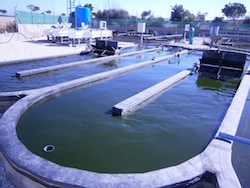The All-gas project, funded by the European Union, has achieved a milestone: successful crop of algae biomass at its site in Chiclana in Southern Spain. The goal of the project is to develop low-cost biofuel from algae grown in wastewater. The All-gas project proposes using this wastewater, as well as CO2, generated in biomass boilers from residuals such as garden waste or olive pits to feed the algae, which in turn are converted into biogas. A part of the biogas is CO2, which gets separated from the biomethane and recycled.
According to a news release, the algae crop has produced outstanding results – the biomass obtained shows a particularly high energy potential relative to its digestibility level, with a methane production capacity of around 200-300 litres of gas per kilogram of biomass processed by anaerobic digestion. The microalgae also successfully purified wastewater.
Launched in May 2011, the five-year project has already completed its pilot phase (the first two years) in a 200 square meter facility. The plans for the construction of the biomass plant are on schedule, and a one-hectare prototype is under construction. The project’s final phase will span 10 hectares – the equivalent of ten football fields – believed to be the largest in the world.
 It is expected that by 2016, the biofuel produced by the All-gas project will be enough to power 200 vehicles. When the project reaches its demonstration phase, the biogas produced will be used to power public buses and garbage trucks in the region of Cadiz.
It is expected that by 2016, the biofuel produced by the All-gas project will be enough to power 200 vehicles. When the project reaches its demonstration phase, the biogas produced will be used to power public buses and garbage trucks in the region of Cadiz.
According to Frank Rogalla, Project Coordinator and FCC Aqualia’s Director of Innovation and Technology, “This original new approach to bioenergy means that Spain’s 40 million population could power 200,000 vehicles every year with a single toilet flush. The All-gas project is going to change the face of wastewater treatment by generating a valuable energy resource from what was previously considered undesirable waste.”
As Nicolas Aragon, Chiclana’s environmental councilor, adds, “This is not only an R&D project, but also a way of reducing costs and investing in the protection of our natural environment. Chiclana is a worldwide tourist destination and from now on, we will show that along with attracting visitors with our sunshine and beaches, we can also grow sustainable biofuel with our natural resources.”
The All-Gas consortium is led by FCC Aqualia, and comprises five other organisations, from Germany (Fraunhofer – Gesellschaft), Austria (BDI), the Netherlands (Feyecon y Hygear) and the UK (University of Southampton).

